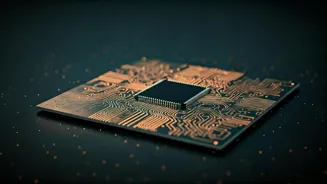Manufacturing Roadblocks Unveiled
The nascent field of quantum computing has frequently been hampered by various technological bottlenecks. A central challenge lay in the creation of the intricate
quantum computer chips themselves. The production of these chips, designed to exploit the principles of quantum mechanics, has historically faced significant hurdles. This is a consequence of the exquisite precision and unique materials involved in creating quantum bits, or qubits. The qubits are the core units of quantum information. The intricate layouts and stringent requirements have long kept quantum chip manufacturing from scaling up. This manufacturing issue has made it very difficult to produce the chips at a large enough scale, limiting the development and deployment of quantum computers. Consequently, this challenge has been a primary roadblock, slowing the progress of quantum computing technologies.
Overcoming the Hurdles
Researchers, after much dedicated effort, have made a significant advancement that effectively tackles the primary manufacturing challenge. This breakthrough centres on a new, streamlined technique that simplifies the production process. Previously, the creation of qubits often involved complex procedures that were both time-consuming and prone to errors. This innovative approach now allows for a more efficient and accurate method for fabricating quantum chips. This includes creating more consistent, reliable qubits. The result is a dramatic boost in efficiency, reducing the overall time and cost required to manufacture quantum chips. The technique promises the ability to scale up chip production, leading to a more widespread availability of the technology.
Impact of the Breakthrough
The significance of this manufacturing breakthrough extends far beyond the lab. It signifies a critical step towards the practical application of quantum computing. The streamlined production process holds the potential to unlock a wide range of applications. It could speed up the development of quantum computers. This has a lot of potential for solving complex problems in fields such as medicine, materials science, and artificial intelligence. The ability to create more and better quantum chips means more research and development. It also provides a path toward building more complex and reliable quantum computers, accelerating the progress of quantum computing technologies.
Future Implications
Looking ahead, this advance represents a key turning point for the future of quantum computing. The ability to manufacture quantum chips more efficiently and economically opens the door to significant growth. It is anticipated that this breakthrough will prompt increased investment. This will accelerate research and development. This could also potentially bring quantum computers into more areas of modern life. Scientists, engineers, and investors are all optimistic. The advancement shows that quantum computing's progress is picking up the pace, moving it from a theoretical concept to a real-world technological marvel.














